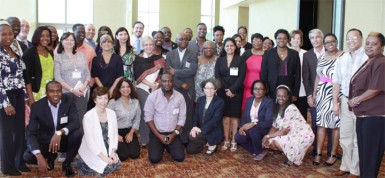While the HIV response in the Caribbean has made “remarkable” progress, inequality and exclusion continue to hamper efforts to reduce new infections and the number of people on treatment, a meeting of government and civil society representatives from eight Caribbean countries heard last week.
During a three-day workshop hosted by the joint United Nations Programme on HIV/AIDS (UNAIDS) and supported by the Ford Foundation, the group discussed cultural, social and political barriers to eliminating stigma and discrimination and increasing access to social justice, with a view to finalising country-specific strategies to strengthen their HIV programmes by making them more responsive to human rights, a press statement said.

However, stigma and discrimination against people living with HIV and key populations such as sexually active young people, men who have sex with men, transgendered people, sex workers, people who use drugs, homeless people and prisoners, remain a major obstacle to expanding access to HIV services. It also hinders people’s ability to live full and productive lives of dignity, the workshop found.
According to UNAIDS Caribbean Regional Support Team Director, Dr Ernest Massiah, the investments made in securing social justice in the context of HIV would positively impact other areas of Caribbean life.
“The fundamental challenge we are faced with is recognising the equality and humanity of all. The lack of attention in Caribbean societies to ensuring the rights of all citizens is the reason we have problems with under-development. Investment in human rights will give returns beyond the HIV response by helping societies to develop,” Dr Massiah said.
Participants from Barbados, The Dominican Republic, Haiti, Jamaica, St Lucia, Suriname, Trinidad and Tobago and Guyana, explored practical ways to integrate human rights into their HIV responses. They developed detailed plans to address a number of country-specific issues, including workplace discrimination, gender-based violence, discriminatory laws and prejudice in the healthcare, social security, law enforcement and judicial systems.
Chief of the UNAIDS Human Rights and Law Division Chief Susan Timberlake, explained that this and other United Nations agencies and some global partners will support the countries to implement their national human rights and gender equality action plans.




